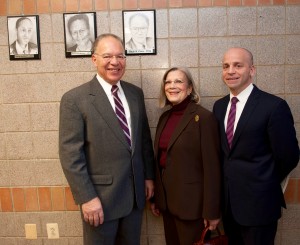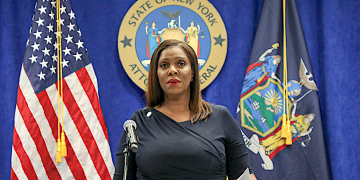Social and emotional maturity are as critical to job success as academic excellence, according to Hugh B. Price, yet schools tend to downplay the soft skills.
Price is trying to change that, and on Feb. 26 he brought his message to the Biondi School in Yonkers when he was inducted in its Black History Wall of Fame.
Young men and women are at Biondi because they have behavioral problems or have abused drugs or alcohol or have been delinquent. School districts in New York City and Westchester County sent them to the private, special education school to learn how to master their emotions and behaviors as they learn academic and vocational skills.
Such programs will become increasingly crucial for a healthy economy, Price wrote last year in an economic study for the Brookings Institution. Demographic trends indicate that African American and Latino youth will comprise a growing proportion of the workforce. Â Yet, despite “glimmers of progress,” they still consistently lag in academic achievement.
Price, who lives in New Rochelle, and the Biondi School are essentially in the same business: helping children who are struggling against overwhelming odds to build good lives. Yet, until recently they were unaware of one another.
“You have to meet this guy,” a friend told Alan Mucatel, executive director of the nonprofit agency that operates the school, when he was looking for a candidate for this year”™s Black History Month celebration.
The connection was obvious.
Price”™s 40-year career spans the law, social advocacy, journalism and philanthropy. He has worked in the inner city as an attorney, written editorials for the New York Times, directed a public television production center and managed a grant fund for minority opportunities at the Rockefeller Foundation. As head of the National Urban League from 1994 to 2003, he was credited with stabilizing its finances and revitalizing its mission. He has written education books, including “Achievement Matters: Getting Your Child the Best Education Possible” and “Strugglers Into Strivers.”
Perhaps more significantly, he has devoted time to mentoring at-risk youth.
Price is a tall, imposing figure, at once confident and authoritative yet warm and caring. Â Even at age 74, he seems like the kind of man who can talk easily with a rebellious teenager. He directed his comments at the wall of fame ceremony more to the students than to school officials and dignitaries in the audience.
He singled out for praise a group of dancers who had interpreted the inspirational song, “I Can Only Imagine,” but the dancers were no longer in the auditorium. After the event he sought them out, when the cameras were no longer filming and the attention was no longer on him, to talk with them individually.
During his keynote address, Price told a story about a group of young men he been asked to mentor in New Haven, Conn. They were “bad actors” who had been in and out of Juvenile Court. He met with them three afternoons a week. One day he was delayed at his Yale Law School class and arrived late. One of the youths had been chosen to speak for the group.
“Mr. Price, being with you and the guys is the single most important thing in our lives,” he said. “If you are late again, we will know that it”™s not the single most important thing in your life.”
That incident underscored the power and potential of mentoring troubled youths. Many of them do not have an adult in their lives who they can count on. They yearn for adult attention. But the adults have to reciprocate.
“If you can”™t be there” Price said, “you will not have the type of relationship they need.”
Later, he mentored youths for Westchester Clubmen, a group of African-American men who created an educational intervention program for young men from low income families. One day he asked a youth about his interests. The young man mumbled that he wrote editorials, and he barely looked at Price.
“I write editorials for the New York Times,” Price responded, and he asked what makes an editorial? The young man perked up and they began talking.
Then Price asked what he was writing. The youth perked up even more, and they became deeply immersed in conversation.
“It showed that young people can be reached,” Price said. They can be engaged when you go where they are interested.”
Students with weak social and emotional skills struggle perpetually in school, he explained in his Brookings study. They act out, interact inappropriately with teachers and classmates, pay scattered attention to class work, and skip school.
The brain science is clear, he said, on the connection between emotional and social development and the ability to achieve in school. These skills also are critical to getting jobs and making good wages.
“You can come to work with good academic credentials, but if you go off the handle you will not succeed.”
But urban school districts that serve the most vulnerable students tend to see social and emotional development as peripheral programs, according to Price.
The programs are expensive, especially for the most troubled youths and especially at the beginning of the process. But according to a cost-benefit analysis of the National Guard Youth Challenge Program, a pioneer in social and emotional education, every $1 spent returns $2.66 in societal benefits.
“The cost of not doing it is very clear,” Price said. “If you can”™t function in the labor force, the damage to your future family and the community is as clear as day.”
The Biondi School provides year-around special education services. The middle school and high school are located on a 30-acre campus in Yonkers. The kindergarten and elementary school are in the Bronx. They are operated by Leake & Watts Services, a $90 million nonprofit agency that runs a variety of programs for 8,000 at-risk children, adults and families throughout New York City and Westchester County.

















